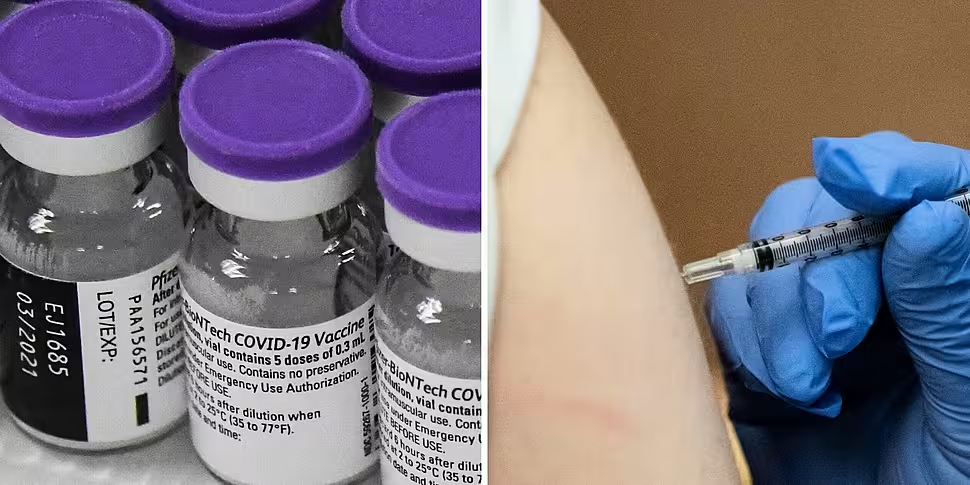Mixing COVID-19 vaccines makes perfect sense, and has moved beyond an academic discussion.
That's according to Liam Fanning, Professor of Immunovirology at UCC.
He was speaking as the Department of Health has sought legal advice on mixing vaccines made by different manufacturers, according to the Irish Times.
Prof Fanning told Newstalk Breakfast vaccine mixing is well underway in other countries.
"We've seen around the world that many countries have been giving heterologous vaccines - in fact actually [German Chancellor] Angela Merkel herself got one.
"She got the vector-based one and then she got an mRNA one... so I mean it is less than even an academic discussion at this stage.
"And from an immunological perspective it makes perfect sense to use boosters.
"I don't think anywhere in the world are they going to be using the viral vector-based vaccines as boosters - I think they're going to be mRNA vaccines around the world".
'Clinical studies ongoing'
In a statement on Tuesday, the World Health Organisation (WHO) said studies on heterologous vaccines - or 'mixing and matching' - are continuing.
"WHO with support of the Strategic Advisory Group of Experts (SAGE) on Immunization and its COVID-19 Vaccines Working Group is reviewing the emerging evidence on the use of heterologous priming schedules.
"In a heterologous priming schedule, the second dose uses a different vaccine product than the first dose.
"The most common reason for considering a heterologous COVID-19 vaccine as second priming dose is lack of availability of the same vaccine in settings with limited vaccine supply or unpredictable supply.
"Interchangeability of vaccine products would therefore allow for added programmatic flexibility."
But it added that heterologous priming "should only be instituted if supportive evidence is available."
"While there are currently no data for heterologous priming with other vaccine products, a large number of clinical studies of various vaccine combinations and schedules are currently ongoing.
"SAGE will review these data as they become available and update the recommendations accordingly", it added.
Vaccinating kids
On vaccinating younger cohorts, Prof Fanning says parents or guardians should inform themselves - but not be nervous.
"Go to the [HSE] website, get information from a verified website.
"But we've administered hundreds of millions of these vaccines and they have been shown to be safe.
"Compare it to the risks when you pick up COVID-19 and some of the complications associated with COVID-19.
"Even if they are infrequent, you don't want your child to be that one - and also it protects them with respect to this flu season and maybe an RSV [Respiratory Syncytial Virus] season that's coming around.
"We've seen in New Zealand that they've had a resurgence in RSV - in fact, they've had nearly six months worth of RSV in a couple of weeks.
"So we want to protect our children as much as possible from having complications of maybe COVID-19 and the flu - or another respiratory virus - coming into the winter.
"We didn't have that last year, so we really don't know what it's like when we have maybe the two viruses circulating".
It comes as the HSE says vaccination of children aged 12 to 15 will begin 'within days' of registration opening this Thursday.
Officials say they have "held back as many places as possible" this weekend so teenagers can get COVID-19 vaccines quickly.
It means people in the age group could get their first doses as soon as Saturday or Sunday.
Damien McCallion, the HSE's national lead for the COVID-19 vaccination programme, told Newstalk on Tuesday that vaccination will begin almost immediately.
"The registration system will open on Thursday, and we would anticipate being able to start vaccination within a couple of days of registration.
"What we've done this weekend is try to hold back clinic places.
"We're going to try to allocate as many slots as possible for those parents who register their children on Thursday, Friday and into the weekend."
There will not be walk-in clinics for teenagers at first, with Mr McCallion saying they will look again to see if they are needed later in the rollout.
He noted the HSE is also looking at evening clinics with extended opening hours, due to the logistical challenges of parents bringing children to get vaccinated during weekday working hours.









